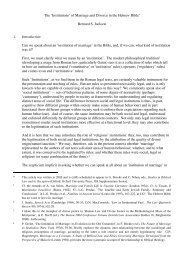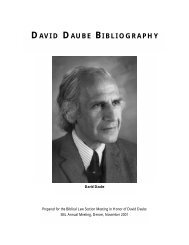Here - Deborah Charles Publications
Here - Deborah Charles Publications
Here - Deborah Charles Publications
You also want an ePaper? Increase the reach of your titles
YUMPU automatically turns print PDFs into web optimized ePapers that Google loves.
- 49 –plays little or no role in determining guilt. Remarkably, however, Rava innovated a requirement of intention in order to renderliability for both civil and ritual violations. Furthermore, he carved a distinction between damages caused through negligence andthose resulting from intent, and assigned corresponding degrees of liability. Similarly, within the realm of ritual law he exemptedthose transgressions which result not from any malicious intent, but from mere physical desire.A close analogue to Rava’s system can be found in Aristotle’s discussion of corrective justice in the fifth chapter of hisNicomachean Ethics. For Aristotle, legal and moral culpability necessitate intent. Consequently, Aristotle exempted from liabilitynot only damages incurred accidentally, but also torts committed out of passion. Given the similarity between Rava’s andAristotle’s respective approaches, and given the intellectual and philosophical atmosphere prevailing over Rava and his circle,there is much to be discovered concerning the moral concepts underlying Rava’s legal thought.Shana Strauch Schick is a Post-Doctoral Fellow at Yad Hanadiv’s Jewish Culture in the Ancient World Program at BarIlan University and a fellow of the Legal Theory and Jewish Studies Research Seminar at the Van Leer JerusalemInstitute. She recently completed a doctorate in Talmud from Bernard Revel Graduate School at Yeshiva University whereshe also received an MA in Bible. Her dissertation, “Intention in the Babylonian Talmud: An Intellectual History,” traceshow the concept of intention was conceptualized and evolved in the legal reasoning of the Babylonian Amoraim. Whileworking toward her doctorate she completed the Graduate Program in Advanced Talmud at Stern College, where shecontinued to study and teach for several years.Zvi SeptimusZvi Septimus (University of Toronto) and Lena Salaymeh (UC Berkeley School of Law)– Marriage for sex in medieval Jewish andIslamic legal debates (Session 5C)Zvi Septimus is Anne Tanenbaum post-doctoral fellow at the University of Toronto. He was formerly Alan M. StroockFellow for Advanced Research in Judaica at Harvard University and received his PhD in Jewish Studies (Talmud) fromUC Berkeley. For the abstract, see the entry for Lena Salaymeh, above.Haim ShapiraHaim Shapira (Bar-Ilan University), Jewish Courts under Roman Rule: The Tannaitic Evidence (Session 6B)What was the nature and structure of the Jewish judicial system in the land of Israel under Roman rule? Was there a "national"judicial system with hierarchic structure (headed by the Patriarch and the Central Court) or only individual judges dispersed in theJewish communities around the country? Where there permanent courts that could enforce there verdicts upon the parties or onlyprivate courts that were respected by parties that selected them? Historians and Jewish-law scholars are divided among themselveson this issue for more than a century. Progress was made when scholars began to distinguish between normative texts and historicalevidence. Following this distinction, historians attempted to find historical evidence either within rabbinic literature or beyond it inorder to answer these questions. In this paper I return to the normative texts, focusing on the tannaitic literature, attempting toexplore the rabbinic view about the nature the judicial system. Does Tannaitic literature reflect the existence of institutional judicialsystem? Does tannaitic law demand or assume permanent courts holding coercive power or private courts that were selected by theparties?Dr. Haim Shapira is a member of the faculty of law at Bar-Ilan University, where he teaches Jewish law andJurisprudence. He received his Ph.D. from the Hebrew University of Jerusalem (2002), where he studied law and Jewishstudies. He was a fellow of the school of social science at the Institute for Advanced Study in Princeton USA (2005-6).Among his recent publications are: "'For the Judgment is God's' – Human Judgment and Divine presence", Bar-Ilan LawReview (2010); "Majority Rule in the Jewish Legal Tradition", Hebrew Union College Annual (forthcoming).





